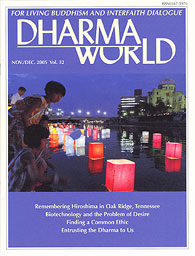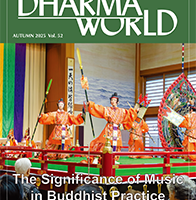November-December 2005, Volume 32(PDF)
Remembering Hiroshima
Introductory Essay
Returning to the Path of “One Truth” by Yoshiaki Sanada
Yoshiaki Sanada is a professor of law who has taught Western legal history and comparative law based on Islamic law at Chuo University’s School of Law in Tokyo. Since 1994 he has been a guest professor at the Institute of Comparative Law of the China University of Politics and Law in Beijing. He is also director of the Peace Research Institute, which is affiliated with the Japanese Committee of the World Conference of Religions for Peace.
Reflections
A Mind That Seeks the Truth by Nichiko Niwano
Nichiko Niwano is president of Rissho Kosei-kai and the Niwano Peace Foundation, a president of the World Conference of Religions for Peace (WCRP), and chairman of Shinshuren (Federation of New Religious Organizations of Japan).
The Lotus Sutra’s World View Regarding Peace by Nikkyo Niwano
This essay is part of a continuing series of translations from a volume of inspirational writings by the late founder of Rissho Kosei-kai. DHARMA WORLD will continue to publish these essays because of their lasting value as guidance for the daily practice of one’s faith.
Nikkyo Niwano, the late founder of Rissho Kosei-kai, was an honorary president of the World Conference of Religions for Peace and was honorary chairman of Shinshuren (Federation of New Religious Organizations of Japan) at the time of his death in October 1999.
Essays
The Power of Memory and Imagination by Juan Masia
Juan Masia is director of the Institute of Life Ethics at Comillas Pontifical University, Madrid. He was ordained a Roman Catholic priest in Tokyo in 1973, and taught ethical theology and the history of philosophical thought at Sophia University there. Dr. Masia also acts as a special fellow of the Peace Institute affiliated with the Japanese Committee of the World Conference of Religions for Peace.
Remembering Hiroshima in Oak Ridge, Tennessee by Miriam Levering
A large Japanese temple bell now serves as a symbol of peace between the United States and Japan in the city that processed the uranium for the atomic bomb dropped on Hiroshima.
Miriam Levering was educated in history and the comparative history of religion at Wellesley College and Harvard University, where she received her Ph.D. in 1978. She teaches Buddhism, Chinese and Japanese Religion at the University of Tennessee in Knoxville. She has edited a book called Rethinking Scripture, a study of the concept and use of sacred texts in the major religious traditions, and has written many articles on women and gender in Ch’an and Zen Buddhism.
Biotechnology and the Problem of Desire by William R. LaFleur
While appreciating the altruism behind organ donation for transplant surgery, this scholar considers important the Japanese insistence on not overlooking the troubling moral posture of the organ recipient.
William R. LaFleur, the Saunders Professor in Japanese Studies at the University of Pennsylvania, taught earlier at Princeton and UCLA. In addition to studies of medieval Japanese Buddhism, he wrote Liquid Life: Abortion and Buddhism in Japan and is a senior fellow at Penn’s Center for Bioethics. Recently researching the approach to bioethical questions in Japan, he co-edited (with Gernot Bohme and Susumu Shimazono) Dark Medicine: Rationalizing Unethical Medical Research in Germany, Japan, and the United States, to appear in 2007.
Fundamental Buddhism and the One-vehicle Teachings of the Lotus Sutra in the Soteriology of Rissho Kosei-kai by Ranjana Mukhopadhyaya
The doctrine of the lay Buddhist group could be said to be a fusion of two distinct traditions that emerged during the course of Buddhism’s development and expansion from India to other Asian cultures.
Ranjana Mukhopadhyaya specializes in sociology of religion and Japanese religion. She did her master’s degree in sociology and M.Phil. in Japanese studies from the University of Delhi. In 2003, she received her doctoral degree in religious studies from the University of Tokyo. At present she is an associate professor at Nagoya City University. She has published on Engaged Buddhism, Buddhist ethics, modern Japanese Buddhism, and new religious movements. She is the author of Nihon no shakai sanka bukkyo (Engaged Buddhism in Japan).
Dialogue
Finding a Common Ethic
A Dialogue between Hans Kung and Nichiko Niwano
The 22nd Niwano Peace Prize was awarded to Dr. Hans Kung, a Roman Catholic theologian and president of the Global Ethic Foundation in Germany and Switzerland. Together with his contributions to interfaith dialogue and cooperation, Dr. Kung’s advocacy of a “Global Ethic” as a way of realizing world peace has won him recognition around the world. In this commemorative dialogue with Rev. Nichiko Niwano, president of the Niwano Peace Foundation, he spoke of two aspects that should serve as signposts in this confused world: a common ethic and a universal sense of values.
The Stories of the Lotus Sutra
Entrusting the Dharma to Us by Gene Reeves
In chapter 22 of the Lotus Sutra, Shakyamuni urges the many assembled bodhisattvas to spread the sutra with all their hearts and make it known far and wide.
Gene Reeves is currently studying, teaching, and writing on Buddhism in Tokyo. A consultant and teacher at Rissho Kosei-kai, he was recently a research fellow at Rikkyo University. Before coming to Japan in 1989, Dr. Reeves was the dean of Meadville/Lombard Theological School and professorial lecturer in the Divinity School of the University of Chicago.
Buddhist Living
The Seeds of Thanksgiving
This article is based upon a testimonial speech given by, and an interview held with, Mr. Hiromasa Igarashi, a man who discovered the seeds of thanksgiving by watching people find happiness through faith.
Hiromasa Igarashi is a member of the Tsuruoka Branch of Rissho Kosei-kai in Yamagata Prefecture.
The Threefold Lotus Sutra: A Modern Commentary (85)
The Sutra of the Lotus Flower of the Wonderful Law
Chapter 10: A Teacher of the Law (4) by Nikkyo Niwano
This is the eighty-fifth installment of a detailed commentary on the Threefold Lotus Sutra by the late founder of Rissho Kosei-kai, Rev. Nikkyo Niwano.























































































